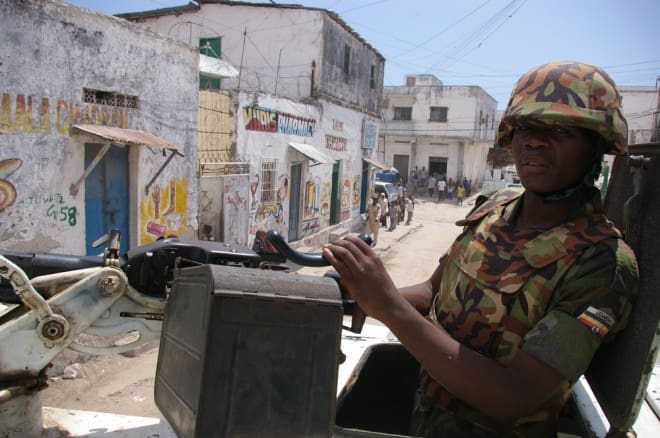In another less-than-successful example of the Obama administration trying to run a kinetic military action by leading from behind, the policy of outsourcing the fight against al-Shabab, the al-Qaida-aligned insurgents in Somalia to Ugandan and Burundian troops hasn’t worked exactly as planned. The problem: a large portion of the ordnance fired back at the African Union troops has a US origin. And, according to one report, it’s being sold to the insurgents indirectly by Ugandan troops the US is supporting with materiel and money…
[M]ost of the fighting against the Islamic terror group, which has lured as many as 50 Somali-American kids to Mogadishu and even sent one on a suicide mission, is done by the roughly 9,000 Ugandan and Burundian soldiers belonging to the African Union’s peacekeeping force in Mogadishu, codenamed “AMISOM.”
In exchange, Washington pays the troops and sends them regular consignments of guns, rockets and ammo. Between 2007 and 2009, the bill for U.S. taxpayers came to around $200 million — and has probably doubled since then.
The problem is, the Ugandan army withholds most of the peacekeepers’ $550 monthly paychecks, keeping the money in bank accounts in Uganda accessible only by the troops’ families. Considering “limited shopping opportunities for embattled AMISOM troops, you would think that makes sense to keep their money at home,” Pelton wrote. “Except that the AMISOM payment debacle leaves thousands of troops surrounded by tons of weapons with no way to buy even ’small small’ things like personal items, sweets or mobile phone recharges to call home.”
So the Ugandans sell their excess weaponry to intermediaries who then sell it on to al-Shabab. And to keep up their racket, the peacekeepers make sure to shoot at every opportunity, burning through “an extraordinary amount of ordnance” to justify continued arms shipments from Washington.
It’s just like federal agencies buying primo tricked out laptops and Aeron chairs for everyone in the waning weeks of the fiscal year to make sure they use up all of their budgeted funds. Otherwise, they might not get the full amount the following year.
It sounds like the problem is a conspicuous lack of direct American oversight and involvement in the process. Of course, the military’s stretched pretty thin these days fighting three wars. And with another $1 trillion in upcoming defense cuts, things aren’t likely to get better any time soon.





[Digression Alert] I don’t believe we should *ever* put boots on the ground in places like Somalia, Ethiopia or Uganda unless vital American interests are at stake. Even then, our presence should be as small as possible to protect those interests (usually by the targeted killing or capture of specific bad guys) and should end as quickly as possible.
These insoluble, perennial shitholes manage to keep themselves miserable, starving and overcrowded for generations, and no foreign aid or intervention ever seems to improve their situation. Somalia starves for decades on end, but Somalis always find the energy to attack humanitarian aid providers and peacekeepers.
Ugly as it is, acting through proxies like the untrustworthy Ugandans is the only realistic way of acting in those parts of the world.
+1
Chris, that was no a digression. It was a boxcar full of common sense.
Sorry, but Africa is a cesspool and we are best to stay out of it as much as possible, I have always seen nothing but trouble there. Is there a single nation there without some sort of voracious violence or dictator out to destroy one group or another? I’d almost rather live in Kalifornia…
Just to be clear, I am not saying we should have a boots on the ground in Somalia. Only that we’ve completely handed this over to incompetent and corrupt troops without much oversight.
We just need to leave that part of the world alone altogether and only involve our military in things that directly affect our country…like actual attacks on our citizens. Then maybe some of these terrorist groups would have to look for another scapegoat for their power struggles.
Aeron chairs aren’t all they’re cracked up to be. Just sayin.
If you’re not reading David Axe and Co. at “War is Boring” on a regular basis, you’re missing quite a lot. I highly recommend the site.
http://www.warisboring.com/
Comments are closed.